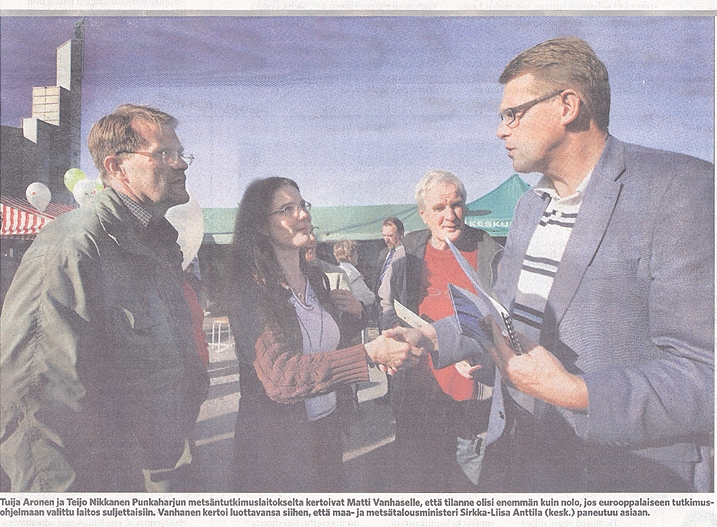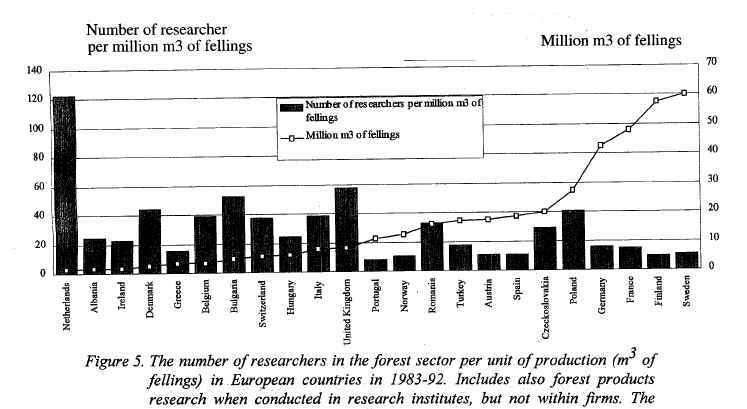Punkaharju
Metla's executive board and general director announced 2007-11-27 that three of the provincial research stations were suggested to be permanently closed 1st of January, 2010. More information (in Swedish) can be found by clicking this link! In English the plan is in "News and Views". These units are Kolari, Kannus (located in Österbotten) and... PUNKAHARJU!! The decision was said to be due to the productivity enhancement program set by the Ministry of Finance which demands Metla should cut its personnal by 150 man-years within a couple of years.
The Punkaharju Research Unit has research on forest genetics, and practical applications of forest tree improvement methods. Management of exotic tree species and special trees is also studied at the Research Unit. Forest Genetic Research has been going on where since 1920.
The decision still needs to be confirmed by the Ministry of agriculture and forestry and before that happens, the politicians will have their say. The first reaction by the politicians was to get the decision postponed till after summer 2008, probably to give time for Punkaharju to strike back. The second sign was a visit by the Finnish prime minister Sept 2008, and the third a statement by Minister for Agriculture and Forestry, Sirkka-Liisa Anttila, in Nov 2008 that the forest research and breeding actitivies at Punkaharju will continue.
Some comments by Dag Lindgren:
The demand for timber and wood from the forest is higher in Finland now than ever before. Finland is closing down factories at an increasing speed, and the main reason seem to be lack of timber in combination with fears that it will be still worse soon. The global warming seems a larger and more convincing threat than has ever before been realised, and it is no doubt forests play a major role as part of the remedy. The end of cheap oil and the air contamination by the use of fossil fuel is more evident than ever before. It is talked about savings on fossil resources and changing to use sustainable resources instead and in general terms about sustainability. It seems that some weird mind in Finland is timing its drastic cut in forest research perfectly with the raising demand on forest research. Even the area of forest research cut down (breeding) is a perfect target for reduced forest production, it is the research area which has the largest impact of future production at the smallest cost and environmental problems.
From Metla's web: "Finland relies more heavily on its forests than any other country in the world. Against this background it is easy to understand the importance of forest research in Finland." Evidently many important decision makers in Finland do not understand what is easy to understand for Metla.
International comparisons of the investment in forest research can be made in relation to the wood harvested per country. Finland is in the bottom of Europe!!! (and probably the World, see comparison below). The ambition of the current reduction seems aiming at giving Finland a clear and firmly anchored jumbo rank considering forest research! Already as it is now, Finland lags behind Sweden (which I guess is a good argument in Finland)!
For Sweden it is not good that Kolari will be shut down. It is situated on the border of Sweden at Mounio river. That is the manned forest research station closest to about one tenth of the Swedish forest land in the far north. Who will now look for the Swedish areas, which are so marginal so Swedes do not care to look for them themselves?
Metlas transformation has an edge against Forest Genetics and Tree Breeding, the areas which are most relevant for the issues I point at above, and are most dependent on continuity in operation.
On the picture below some of the Punkaharju staff discusses forest tree breeding and Punkaharju with the prime Minister of Finland in September 2008. The prime minister is said to be well-informed about the significance of forest tree breeding to Finland.

Metla informerar om neddragningsplanerna under rubriken:
"Tryggande av Skogsforskningsinstitutets konkurrenskraft och verksamhetsförutsättningar"
Jag tycker nog detta i onödigt hög grad är en förskönande omskrivning för "avveckling av försöksstationer". På mig hade det gjort ett trevligare intryck om Metla sagt: "Vi är ålagda att göra besparingar och det här är det sätt vi valt" istället för att dölja budskapet i "buzz-words" för att få ledningen att framstå i bättre dagar inför politikerna, och därmed ger intrycket att ledningen bryr sig mer om intrycket än verksamheten. Budskapet att ett Skogsforskningsinstitut utan Punkaharju får högre konkurrenskraft och bättre förutsättningar verkar falskt. Faktiskt tror jag det är tvärtom, i forskningsresultat per krona är nog forskningen i Punkarjarju effektivare än i Helsingfors, och att lägga ned Punkaharju sänker nog konkurrenskraft och verksamhetsförutsättningar och verkar alltså i exakt motsatt riktning mot angivet mål!
I have experienced some changes of this character in Sweden. Reforms
like this reduces the productivity, I estimate that the cost of the
program in research, which is not done or less well done is something
like 350 man-years. It is very hard to get correct figures.
Eeva Hellström, Matti Palo, Birger Solberg
FINANCING FOREST SECTOR RESEARCH: Theory and
European Experiences. IUFRO Occasional Paper No. 10 ISSN 1024-414X
